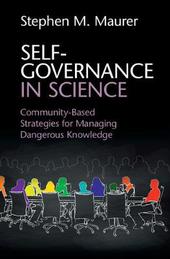
|
Self-Governance in Science: Community-Based Strategies for Managing Dangerous Knowledge
Hardback
Main Details
| Title |
Self-Governance in Science: Community-Based Strategies for Managing Dangerous Knowledge
|
| Authors and Contributors |
By (author) Stephen M. Maurer
|
| Physical Properties |
| Format:Hardback | | Pages:312 | | Dimensions(mm): Height 235,Width 157 |
|
| Category/Genre | Public finance |
|---|
| ISBN/Barcode |
9781107171800
|
| Classifications | Dewey:507.2 |
|---|
| Audience | | Tertiary Education (US: College) | | Professional & Vocational | |
|---|
| Illustrations |
4 Line drawings, black and white
|
|
Publishing Details |
| Publisher |
Cambridge University Press
|
| Imprint |
Cambridge University Press
|
| Publication Date |
16 November 2017 |
| Publication Country |
United Kingdom
|
Description
Commercial and academic communities use private rules to regulate everything from labor conditions to biological weapons. This self-governance is vital in the twenty-first century, where private science and technology networks cross so many borders that traditional regulation and treaty solutions are often impractical. Self-Governance in Science analyzes the history of private regulation, identifies the specific market factors that make private standards stable and enforceable, explains what governments can do to encourage responsible self-regulation, and asks when private power might be legitimate. Unlike previous books which stress sociology or political science perspectives, Maurer emphasizes the economic roots of private power to deliver a coherent and comprehensive account of recent scholarship. Individual chapters present a detailed history of past self-government initiatives, describe the economics and politics of private power, and extract detailed lessons for law, legitimacy theory, and public policy.
Author Biography
Stephen M. Maurer has taught and conducted research at the University of California Berkeley's Goldman School of Public Policy since 1999. Trained as a lawyer, he has published more than forty articles in leading journals on topics ranging from innovation economics to national security. He also has extensive practical experience helping academic and commercial scientists organize community-wide initiatives. Maurer is the editor and lead author for two previous books, WMD Terrorism: Science and Policy Choices (2007) and On the Shoulders of Giants: Colleagues Remember Suzanne Scotchmer's Contributions to Economics (Cambridge, 2017).
Reviews'Stephen M. Maurer blends history, economics, political theory, and legal analysis to explain the dynamics of industry self-regulation. His wide-ranging case studies make Self-Governance in Science an engaging intellectual exploration of private alternatives to government regulation. Maurer has produced the leading analysis of a ubiquitous but underappreciated regulatory phenomenon upon which the modern market economy and regulatory state both depend.' Timothy D. Lytton, Distinguished University Professor and Professor of Law, Georgia State University College of Law, and author of Kosher: Private Regulation in the Age of Industrial Food 'Self-governance has become a trendy buzzword in many different areas, but science certainly counts among its most challenging fields of application. This book is therefore full of fascinating insights. While it refers to self-governance in science, its impact reaches much further. This book is a true must-read for anyone interested in self-governance, whether a lawyer, an economist, or a political scientist.' Florian Moeslein, Philipps-Universitat Marburg, Germany 'Self-Governance in Science explains how the mechanisms of power and control operate across the fuzzy boundaries of markets, governments, and nations. Maurer's incisive analysis of expert communities in science and academia is especially timely in an era when their legitimacy is under renewed political and ideological attack.' Andrew L. Russell, Dean of the College of Arts and Sciences, State University of New York Polytechnic Institute 'It's terrifically interesting and I recommend it to anyone interested in this area ... This is a fascinating book, including the case studies, which range from atomic physics to fair trade coffee ... anybody interested in raising standards in supply chains or finding ways to manage the deployment of new technologies will find a lot of useful insights here.' Diane Coyle, The Enlightened Economist
|